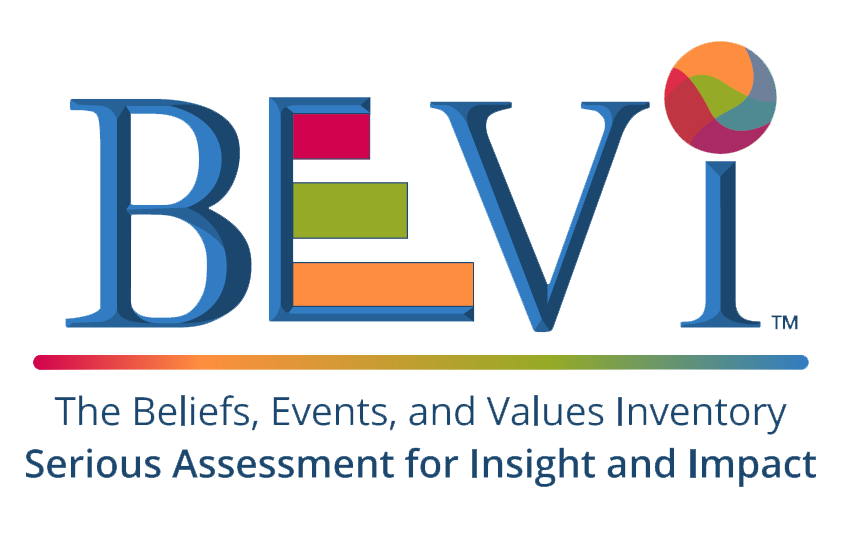Serious Assessment for Insight and Impact

The BEVI is an accessible, adaptable, and powerful analytic tool that may be used in a wide range of settings – from education and research to leadership and mental health – to understand and facilitate processes and outcomes of learning, growth, and transformation.
Based upon over 30 years of research and practice in the U.S. and internationally – and with excellent psychometric properties – the BEVI asks respondents a series of questions about beliefs, values, and life events that seek to illuminate “who learns what and why, and under what circumstances.”
The BEVI moves flexibly across applied and research domains because it consists of four complementary measures built into one instrument: 1) extensive demographic information, 2) a life history questionnaire, 3) a comprehensive assessment of beliefs, values, attitudes, and worldviews, and 4) qualitative “experiential reflection” items.
The BEVI is a web-based system that takes about 30 minutes to complete while generating multiple types of reports for individuals, couples, families, groups, communities, organizations, and institutions.
*Aspects of this website have been excerpted and/or adapted from Shealy, C. N. (Ed.). (2016). Making Sense of Beliefs and Values: Theory, Research, and Practice. New York: Springer Publishing.
BEVI Benefits
Our experience suggests that individuals, groups, institutions, and organizations are interested in the BEVI for a number of reasons, including but not limited to the following:
Relevance
The BEVI is relevant for use in a wide array of settings and contexts. For example, from an applied standpoint, the BEVI helps individuals 1) understand better what they believe and value about themselves, others, and the world at large and 2) reflect upon how such beliefs and values may – or may not – be conducive to learning, personal growth, relationships, and the pursuit of life goals. From the perspective of evaluation and research, the BEVI 1) helps answer questions such as “who learns what and why, and under what circumstances,” 2) allows for the examination of complex processes that are associated with belief/value acquisition, maintenance, and transformation, and 3) analyzes the impact of specific experiences that are implicitly or explicitly designed to facilitate growth, learning, or change.
Applicability
The BEVI may be used flexibly for multiple purposes, from assessing processes and outcomes of various learning experiences to facilitating the growth and development of individuals and groups. More specifically, the BEVI has applications in the following areas (see BEVI Workshops):
- evaluating learning experiences (e.g., study abroad, multicultural courses, general education, training programs/workshops, service learning, etc.);
- understanding learning processes (e.g., who learns what and why, and under what circumstances);
- promoting learning objectives (e.g., increased awareness of self, others, and the larger world);
- enhancing teaching and program quality (e.g., which experiences, courses, programs, etc. have what impact, and why);
- facilitating growth and development (e.g., of individuals, groups, and organizations);
- conducting research (e.g., how, why, and under what circumstances people become more “open” to different cultures);
- addressing organizational needs (e.g., staff/leadership development); and,
- complying with assessment and accreditation requirements (e.g., linking objectives to outcomes).
Excellent Reliability and Validity
In addition to excellent reliability, evidence of validity is indicated by a number of studies demonstrating that the BEVI is able to predict group membership across a wide range of demographic variables, including gender, ethnic background, parental income, political orientation, and religious orientation (see BEVI Validity).
Theoretically and Empirically Grounded
The empirical and theoretical foundation of the BEVI is strong. In development for over twenty years, the BEVI has been subjected to multiple analyses, reviews, and studies by a wide array of interdisciplinary scholars and test development experts. The factor structure of the BEVI is well integrated with EI Theory and the EI Self, which are grounded in decades of scholarship and can help explain why we believe what we believe as well as when, how, and under what circumstances beliefs and values are acquired, maintained, and transformed.
Web-Based Accessibility
The web-based infrastructure for the BEVI is well-developed and field tested. Presuming sufficient internet access, the BEVI may be taken anywhere in the world. Such accessibility offers distinct benefits for individuals, groups, institutions, and organizations, while greatly facilitating processes of data management and analysis.
Adaptable and Affordable
The existing web-based infrastructure for the BEVI provides a good model and system for linking BEVI data with other complementary databases for eventual analysis as well as other measures. Customized analyses are also available upon request, which means that institutions and organizations are able to hone in on very specific analyses that may be of interest. By design, fee rates for administration, reporting, and certification rates are meant to be affordable, with discounts offered for group reporting and certification.
Want to learn more?
Join the global community using the BEVI to advance leadership, mental health, wellness, education, and research.
